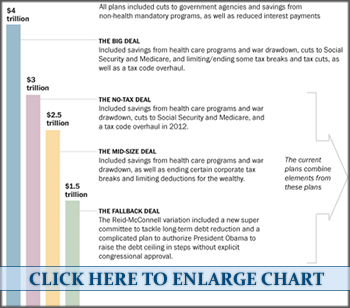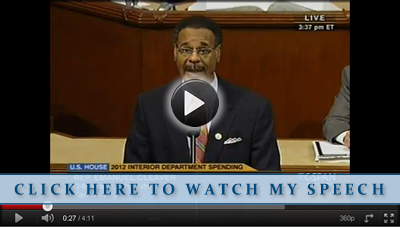| |  | | | |
Down to the Wire

As you know, Congress has been struggling to reach a compromise to raise the debt ceiling. As I write this, we are ever closer to a vote on Speaker Boehner's bill. The Washington Post has an excellent series of graphics on the different proposals here. There is an urgent need to resolve the debt ceiling issue and it is beyond irresponsible not to do so. Without a debt limit increase, the government will either default on its bonds or have to slash spending by approximately 40 percent. Neither scenario is acceptable.
I remain concerned that these negotiations may not conclude by August 2. America is now on the doorstep of default. We cannot allow the failure of these negotiations to become America's failure to pay its bills. To make matters worse, the Commerce Department just released very, very bad news:
Government spending fell this spring for the third straight quarter. And state and local governments cut spending, the seventh time in eight quarters since the recession ended.
The slowdown in growth was broad-based. Business spending on equipment and software grew 5.7 percent in the second quarter, down from the first quarter's 8.7 percent pace and below the double-digit gains posted last year. Americans are seeing little gain in their incomes. After-tax incomes, adjusted for inflation, rose only 0.7 percent, matching the previous quarter and the weakest since the recession ended.
The government also revised data going back to 2003. The data show the recession was even worse than previously thought. The economy shrank 5.1 percent during the recession, which lasted from December 2007 through June 2009, compared to the earlier estimate of 4.1 percent. Both figures represent the worst downturn since World War II.
Complicating an already-weak economy is the debt crisis in Washington. No matter what lawmakers do to resolve that crisis, their decision will likely slow growth in the short term. A deal to raise the borrowing limit would likely include long-term spending cuts, which would withdraw government stimulus at a precarious time.
Yesterday, I held a conference call with business executives from the Fifth District of Missouri. In a wide-ranging discussion, we talked about what a default would mean for them—their businesses, their consumers, and the economy. They were unanimous. If Congress fails to raise the borrowing limit and the government defaults on its debt, it will hurt the global economy, cut government programs, reverse our recovery, slash your retirement, damage America's credit, and punish businesses and consumers.
Democracy demands compromise. We need a bipartisan, balanced agreement, with both spending cuts and revenue increases to reduce the deficit and rebuild our economy. The real question is, where do we make changes? I believe the burden should not be borne by those least able to bear it, as vulnerable communities, seniors, and children depend on vital programs like Medicare, Medicaid and Social Security. The budget of the United States is a moral document; it should reflect our commitment to protect the poor and the middle-class, defend our commitments to seniors, and make wise investments to create good jobs and strengthen our economy.
Until we can come to this agreement, I have decided to support H.R. 2663, the America Pays Its Bills Act of 2011, which simply allows America to avoid default and continue to pay its bills. These are bills we have already incurred—even the Ryan Plan, which many of my colleagues supported, would have necessitated an increase in the debt ceiling. I have heard many of my colleagues compare our current budget and debt ceiling situation to a family as it faces its finances. It is more akin to family dining out at a restaurant, receiving the bill, and skipping out on the check.
As negotiations continue, I thank you for your hundreds of calls, e-mails, letters, faxes, and messages. I will continue to do everything in my power to reach a compromise that will strengthen the economy, create jobs, preserve the solvency of our nation, and protect those who depend on Social Security, Medicare and Medicaid.
Flood Information
Today the U.S. Army Corps of Engineers released a report regarding their planned reservoir drawn down. This year marks the highest runoff season in the Corps' 113 years of record keeping in the Missouri River Basin. This report outlines the Corps' intent to begin to reduce releases at Gavins Point in time to prepare for the 2012 season. The Kansas City and Omaha districts have built websites with many tools to prepare the citizens of Missouri, Kansas, Iowa and Nebraska for the anticipated water levels we will see, including Federal Levee Daily Status and Non-Federal Levee Daily Status. I encourage you to explore the website and learn for yourself what levees are anticipated to overtop, view their flood inundation maps, travel times, access to NOAA's gauge stations and much more information. The folks at U.S. Army Corps of Engineers are constantly updating Facebook with answers to questions asked in this public forum, to provide as much information as possible.
Congressman Cleaver Speaks on Urban Waters

On Monday, I was proud to speak on the House Floor in support of the EPA's Urban Waters Initiative in the FY2012 Interior & Environment Appropriations Bill. Please take a moment to watch the clip above, and read my remarks.
Mr. Chairman, in the committee report for this bill, the Appropriations Committee included some language expressing concerns in regards to the Environmental Protection Agency's Urban Waters Initiative and provides no funding in the bill for this program for FY2012.
I fully understand the Committee's reluctance to extend funding for new broad, cross-cutting initiatives, given our economic situation. However, I feel this initiative has immense value to the millions of people who live in urban areas and who rely on the government to ensure they have clean water to drink and use in their daily lives. My amendment would restore partial funding for the Urban Waters Initiative for Fiscal Year 2012.
Cities share one key characteristic: they're full of people, buildings and businesses. Because everyone shares the same relative space, air and water, environmental impacts are concentrated in smaller areas, including waterways. Urban waters take on large amounts of pollution from a variety of sources, including industrial discharges, mobile sources (e.g., cars/trucks), residential/commercial wastewater, trash and polluted stormwater runoff from urban landscapes. As urban populations often share centralized water sources, this pollution creates public and environmental health hazards like lowered drinking water quality and water bodies that aren't safe to swim in.
EPA started the Urban Waters Program to address water quality challenges in urban watersheds and build capacity of disadvantaged communities through projects that revitalize these watersheds. If maintained properly, urban waters can also yield positive impacts for populations in both urban and upstream communities. Revitalization of waterways can spur employment and the growth of local businesses, and promote improvements in housing, safety, and quality of life in these areas.
Communities across the country are coming together, working with EPA, state, and local agencies, and taking steps to access, restore, and benefit from their urban waters and the surrounding land. My district of Kansas City is one such community. EPA Regional staff are working with the Kansas City and local citizen groups to monitor water quality and plan and conduct improvements to the Blue River Watershed and Brush Creek. Covering 270 square miles, the Blue River comprises the largest watershed in the greater Kansas City metropolitan area. Its drainage is divided between Kansas and Missouri, and flows through three counties, twelve cities, and ten school districts. Brush Creek is the most visible tributary to the Blue River and runs through the urban core's Green Impact Zone. EPA is monitoring water quality along the watershed and assisting in local efforts to conduct large scale watershed planning for Brush Creek and the Blue River.
Whether as part of a cleanup leading to waterfront development or putting monitoring in place to ensure safe drinking water, with EPA's help, community groups across the country have taken the initiative, engaging volunteers, community organizations, and local and state government to make their waters safe for many uses. My amendment provides $3 million for Urban Waters within the EPA's Environmental Programs and Management account. Though it is by no means the maximum amount of funds that this program could utilize, it will ensure that this vital, community-driven initiative can continue. |
Follow me on Twitter!
You can now follow me @repcleaver. As always, I look forward to hearing from you.
Click here to add me >>> https://twitter.com/repcleaver

Emanuel Cleaver, II
Member of Congress
| |
|
|  |
| Kansas City Office
101 W 31st St.
Kansas City, MO 64108
Phone: 816-842-4545
Fax: 816-471-5215 | Independence Office
211 West Maple Avenue
Independence, MO 64050
Phone: 816-833-4545
Fax: 816-833-2991 | Washington Office
1433 Longworth HOB
Washington, D.C. 20515
Phone: 202-225-4535
Fax: 202-225-4403
|
|
|
| |
| | |
|